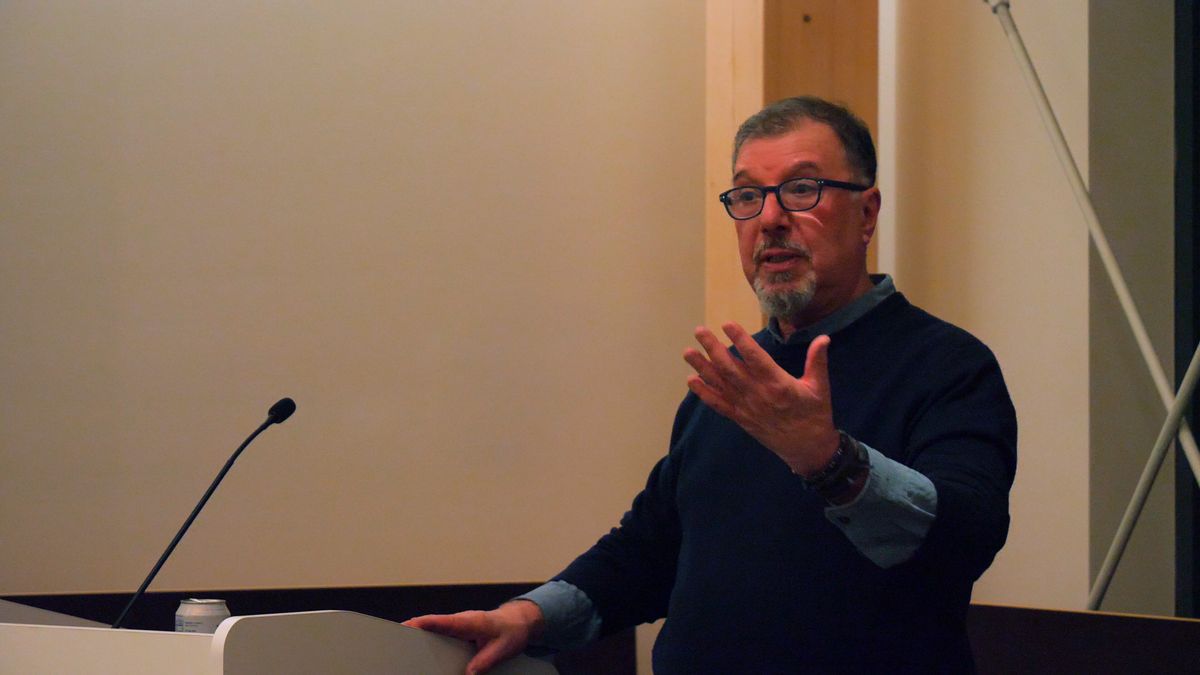Former Palestinian Negotiator Traces Historical Roots of Israel-Palestine Conflict
In the first of a three-lecture series, Dr. Ahmad Samih Khalidi, a Palestinian diplomat, analyzed the history of the conflict, from the birth of the Zionist movement to the 1993 Oslo Accords.

In 1993, Dr. Ahmad Samih Khalidi was negotiating for the Palestine Liberation Organization in Washington, D.C. Last Wednesday, over three decades later, he reflected on his experience in front of a packed room at the college. He described the origins of the contemporary Israel-Palestine conflict and reflected on his diplomatic involvement.
Khalidi, an associate fellow at the Center for Security Policy and former Palestinian negotiator at international conferences, spoke on Feb. 21 in the Lyceum. The lecture, titled “Palestine/Israel: How Did We Get Here? Nationalism, Colonial Intervention, and Catastrophe’s Aftermath,” was the first of a three-part series featuring Khalidi, who also spoke at the college last fall.
“The idea is to have a historically, contextually informed understanding of the current Israel-Palestine conflict, from a scholar in the field who has also long experience in diplomacy,” said Professor of History and Asian Languages and Civilizations Monica Ringer, who introduced Khalidi.
“Every history is pinned by where it begins,” Khalidi said, tracing the modern history of the Israel-Palestine conflict to the Dreyfus affair in France, in which a Jewish military officer was wrongly accused of committing treason — an event that signaled the dangerous position of Jews in European societies that coincided with a wave of pogroms in Eastern Europe.
Observing the Dreyfus affair as a foreign correspondent in Paris, Theodor Herzl, founding father of Zionism, began theorizing the necessity of a Jewish state, Khalidi said.
Khalidi connected Zionism, which started as a minor fringe movement, to the surge of European nationalism in the nineteenth century, speaking of the “nation-state zeitgeist” sweeping the continent. He talked about how both philosemitism (pro-Jewish sentiment) and antisemitism drove the start of the “emotional political project” of Zionism, and the irreconcilability of competing claims to the same land.
He also quoted political leaders such as David Ben-Gurion and Winston Churchill, and explained key events in the history of Israel-Palestine, such as the 1917 Balfour Declaration, announcing the British government’s support for a Jewish state in Palestine, and the 1948 Arab-Israeli War, which resulted in the establishment of the state of Israel.
He spoke of the Nakba, or “the catastrophe” amid the 1948 war — the ethnic cleansing of 750,000 Palestinians — using the collective pronoun “we,” anchoring his personal connection to the history of Palestinian dispossession. Khalidi hails from a prominent Palestinian family, and his ancestors include multiple mayors of Jerusalem during the Ottoman period. Palestine is the “world’s most long-lasting refugee problem,” Khalidi said — Gazans in particular were “exiles on their own national soil.”
“There’s nothing complex or hard-to-grasp about this conflict,” Khalidi said. “All of Palestine has been re-occupied … every single Palestinian is either an exile or under Israeli domination or control.”
In response to student questions, Khalidi lamented the seeming impossibility of a two-state solution for Israel-Palestine, despite acknowledging that the solution was “desirable,” and a “fond lynchpin” in international relations. He said that, despite popular misconception, the 1993 Oslo Accords — where he represented the Palestine Liberation Organization (PLO) as a negotiator — was not the basis of a two-state solution (he described the event as feeling like an “acid-trip-induced-delirium”).
There was an inherent asymmetry present in negotiations, he noted, where the rightful existence of an Israeli state was unquestionably recognized by both sides, but the PLO was simply recognized as the “voice” of the Palestinian people, with no mention of a Palestinian state. Seen as sympathetic to Israel, the Americans were perceived as an “obstacle” to diplomacy, as Palestinians felt that they were “negotiating with one side against two.”
Additionally, he spoke of “how catastrophes create their own unforeseen consequences,” referring to how the trauma of European antisemitism sparked an ongoing cycle of violence and dispossession in Palestine.
Attendees appreciated Khalidi’s perspective in the context of the college’s response to the war.
“I think it’s quite important to have some[one] like [Khalidi] speak, especially in a college that we know has been very wary of making public statements for Palestine or at least to acknowledge the death of Palestinians in Gaza,” said Susana Mosquera ’27.





Comments ()